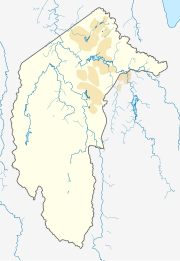Franklin, Australian Capital Territory
| Franklin Canberra, Australian Capital Territory | |||||||||||||||
|---|---|---|---|---|---|---|---|---|---|---|---|---|---|---|---|
 Franklin wetlands | |||||||||||||||
| Coordinates | 35°12′00″S 149°08′33″E / 35.20000°S 149.14250°E | ||||||||||||||
| Population | 7,484 (SAL 2021)[1] | ||||||||||||||
| Established | 2007 | ||||||||||||||
| Postcode(s) | 2913 | ||||||||||||||
| Elevation | 611 m (2,005 ft) | ||||||||||||||
| Area | 2.3 km2 (0.9 sq mi) | ||||||||||||||
| Location |
| ||||||||||||||
| District | Gungahlin | ||||||||||||||
| Territory electorate(s) | Yerrabi | ||||||||||||||
| Federal division(s) | Fenner | ||||||||||||||
| |||||||||||||||

Franklin (postcode: 2913) is a suburb of Canberra, Australia in the district of Gungahlin. It is named after the novelist Miles Franklin. Most streets in Franklin are named after female Australian writers.[2] It comprises an area of approximately 256 hectares. It is bounded by Flemington Road to the north and east, Well Station Drive to the south, and Gungahlin Drive to the west.[3] Franklin is mainly a residential area with higher density, mixed-use development along Flemington Road including a local shopping centre and other retail and commercial tenancies.
Open space
[edit]The suburb of Franklin includes a number of large open space to provide a pedestrian and cyclist network, and to provide an ecological corridor for the movement of native wildlife.[3]
- The Gubur Dhaura Heritage Site provides 360 views of the surrounding landscape and an ochre quarry site which are of cultural significance to the Ngunnawal people. Remains of the Red Hill pipeclay mine, Old Well Station Track and historical markers can also be found here;[4]
- The Mulangarri and North Mitchell Grasslands;
- The Gungaderra Creek;
- Old Well Station Track which connects the Well Station Heritage Precinct (located in the neighbouring suburb of Harrison) with the Gungaderra Homestead, and Gubur Dhaura Red Hill Heritage Site through to the Gungahlin Town Centre.
Demographics
[edit]In the 2016 census, the population of Franklin was 6,419, including 75 (1.1%) Indigenous persons and 3,129 (49.2%) Australian-born persons.[5] 11.1% were born in China, 7.2% in India, 2.9% in South Korea, 2.2% in Sri Lanka, and 2.2% in Vietnam.[5] In the 2011 census, 44.4% of the population was foreign born, the third highest for any Canberra suburb.[6]
Transport
[edit]Light rail
[edit]Franklin is served by three Canberra Metro light rail stations: Manning Clark North, Mapleton Avenue and Nullarbor Avenue. All three stations are located on Flemington Road and opened in April 2019.[7]
Buses
[edit]Franklin is serviced by several ACTION bus routes.
- 18: Travels through Manning Clark Crescent[8]
- 21 & 22: Travels through Hoskins Street, Oodgeroo Avenue and Nullarbor Avenue[9]
Until the opening of the light rail, Flemington Road was serviced by 200 series buses every day.
Geology
[edit]Franklin is underlaid mostly by the Canberra Formation mudstone or volcanics from the late middle Silurian age.[10]
Education
[edit]Franklin residents get preference for:[11]
- Franklin Early Childhood School
- A shared PEA of Harrison School and Palmerston District Primary
- Harrison School
- Gungahlin College
References
[edit]- ^ Australian Bureau of Statistics (28 June 2022). "Franklin (ACT) (suburb and locality)". Australian Census 2021 QuickStats. Retrieved 28 June 2022.
- ^ "Suburb Name search results". ACT Environment and Sustainable Development. Retrieved 10 February 2014.
- ^ a b Gungahlin Development Authority (2006), Franklin Residential Estate Concept Plan, ACT Planning and Land Authority
- ^ "Heritage (Decision about Registration for Gubur Dhaura – Aboriginal Ochre Quarry and Historic Mining Area). Notice 2011" (PDF). Australian Capital Territory Heritage Register. Retrieved 9 March 2019.
- ^ a b Australian Bureau of Statistics (27 June 2017). "Franklin (State Suburb)". 2016 Census QuickStats. Retrieved 27 June 2017.
- ^ "Where do migrants live? (4102.0 - Australian Social Trends, 2014)". Australian Bureau of Statistics. 17 March 2014. Retrieved 19 March 2014.
- ^ "Using light rail". Transport Canberra. Retrieved 24 June 2019.
- ^ Route 18 Transport Canberra
- ^ Route 21 & 22 Archived 30 April 2019 at the Wayback Machine Transport Canberra
- ^ Henderson G A M and Matveev G, Geology of Canberra, Queanbeyan and Environs 1:50000 1980.
- ^ "Priority Enrolment Areas 2015 by Suburb Archived 14 February 2016 at the Wayback Machine" (Archive). Education Directorate, Australian Capital Territory. Retrieved 8 February 2016.

